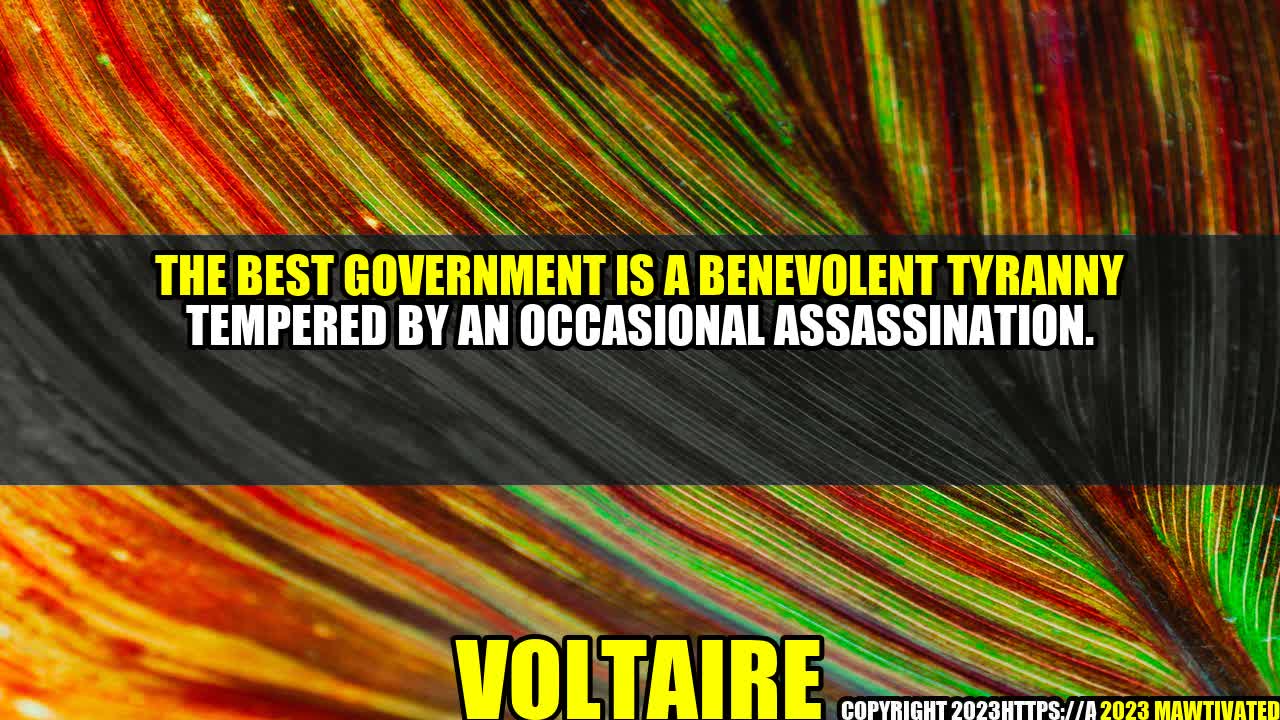The Benevolent Tyranny: The Ultimate Government?

Imagine living in a society where everyone has equal opportunities, where public services are efficient and corruption is non-existent, where public officials and politicians serve with sincerity and integrity. This is the ideal government that everyone aspires to have. However, can we realistically achieve this vision?
In reality, no perfect government exists, but one idea that has been considered over the centuries is a benevolent tyranny. As Voltaire once said, “The best government is a benevolent tyranny tempered by an occasional assassination.” While this may sound extreme, let’s take a closer look at the concept of benevolent tyranny.
The Definition of Benevolent Tyranny
Benevolent tyranny is a form of government where a single ruler or group of people hold absolute power over the affairs of the state. However, this power is exercised with the intentions of serving the greater good of the people. This means that the decisions of the rulers are based on compassion, fairness, and the needs of the general population.
However, we know that power can corrupt. Therefore, the concept of benevolent tyranny is tempered by an occasional assassination. This means that if a ruler or a group of people become corrupt, they can be removed from power by the people or by other means. This ensures that those in power always have the welfare of the people in mind.
Is Benevolent Tyranny Possible?
While benevolent tyranny may sound like a utopian vision, it has been practiced in some cultures throughout history with varying degrees of success. In ancient China, the Confucian system of government, with its emphasis on the welfare of the people, is believed to be an example of benevolent tyranny. Similarly, the reign of Emperor Trajan in ancient Rome is regarded as a time of relative peace and prosperity for the Roman Empire.
However, it is important to note that any form of government can become corrupt, and benevolent tyranny is no exception. Additionally, while the intentions of those in power may be benevolent, their decisions may not always be in line with the needs and wants of the people. Furthermore, the idea of assassination, even as a last resort, raises ethical concerns.
The Pros and Cons of Benevolent Tyranny
Like any form of government, there are both advantages and disadvantages to benevolent tyranny.
Advantages
- Efficient decision-making: A single ruler or group of people can make quick decisions without the bureaucracy and red tape common in democracies.
- Effective public services: With absolute power, the rulers can allocate resources efficiently and effectively, leading to better public services.
- Less corruption: With a small group of people in power, the chances of corruption are reduced.
- Greater stability: The absence of political opposition and dissent can lead to greater stability and fewer conflicts.
Disadvantages
- Lack of freedom: With absolute power, individual freedoms may be restricted, and dissent may be suppressed.
- Risk of corruption: Without checks and balances, those in power may become corrupt and abuse their authority.
- Unaccountable leadership: Without democratic processes, the people have limited control over the decisions made by the rulers.
- Lack of diversity: With a few people in power, diversity in perspectives and ideas may be limited.
Conclusion
In conclusion, benevolent tyranny is a controversial idea that has been debated for centuries. While it can lead to efficient decision-making and effective public services, it also presents a risk of authoritarianism, lack of freedom, and unaccountable leadership. Furthermore, the idea of assassination as a means of tempering corruption is ethically questionable.
Ultimately, the ideal government is one that balances the needs of the people with accountability, transparency, and protection of individual freedoms. While no perfect government exists, we can strive to improve our current systems and hold those in power accountable for their decisions.
Practical Tips:
- Engage in political discussions and debates to stay informed and involved in the decision-making process.
- Vote in elections and hold public officials accountable for their actions.
- Support organizations and initiatives that promote transparency, accountability, and protection of individual freedoms.
Author – Voltaire Story or Background:
Voltaire was a French Enlightenment writer, historian, and philosopher famous for his wit, intellect, and advocacy of civil liberties, including freedom of religion, free trade, and separation of church and state. He is considered one of the most influential figures of the Enlightenment period, and his ideas about government, religion, and human rights continue to inspire modern thinkers.
Examples:
Some examples of benevolent tyranny in history include:
- The reign of Emperor Trajan in ancient Rome, which is regarded as a time of relative peace and prosperity for the Roman Empire.
- The Confucian system of government in ancient China, which emphasized the welfare of the people, and was regarded as an example of benevolent tyranny.
- The rule of Akbar the Great in Mughal India, who was known for his religious tolerance and promotion of the arts and sciences.
Hashtags :
- #benevolenttyranny
- #governmentdebate
- #thegreatergood
- #balanceofpower
- #corruptionprevention
SEO Keywords :
- Benevolent tyranny
- Government debate
- The greater good
- Balance of power
- Corruption prevention
Category:
Politics & Society

Curated by Team Akash.Mittal.Blog
Share on Twitter
Share on LinkedIn